Happy Monday! The Trump administration’s plans to reshore American manufacturing have hit another stumbling block: Building the planned “Garden of American Heroes”—250 statues erected for the nation’s 250th birthday next summer—on time and on budget will reportedly require (you guessed it) sculptors from China.
Quick Hits: Today’s Top Stories
- In what appeared to be an act of antisemitic terrorism, a man on Sunday attacked a march in Boulder, Colorado, raising awareness for Israelis held hostage by the terror group Hamas, leaving eight people between the ages of 52 and 88 injured, including one in critical condition. The man threw Molotov cocktails and directed what witnesses called a “makeshift flamethrower” at marchers in the Run for Their Lives event, a weekly gathering of Jewish citizens in Boulder that aims to support hostages taken in the October 7, 2023, massacre in Israel. An FBI official identified the suspect, who was arrested, as 45-year-old Mohamed Sabry Saliman, an Egyptian national who, according to Fox News, reportedly entered the United States in 2022 and overstayed a nonimmigrant visa. Witnesses say he was yelling “free Palestine” during the attacks in which the victims were burned.
- Russia and Ukraine traded large-scale aerial attacks over the weekend, with Ukraine using drones to strike targets deep inside Russia on Sunday following Russian attacks throughout Ukraine that Ukrainian officials said were the largest overnight air attacks of the war. Deploying drones hidden in trucks and cargo containers, Ukrainian special forces attacked four airfields deep inside Russian territory, including one in Siberia, and struck at least 40 Russian heavy bombers, according to Ukrainian intelligence sources. Seven people were killed Saturday night when two Russian trains, including a passenger train, derailed following the collapse of two separate bridge overpasses, which may have been the result of Ukrainian attacks. Meanwhile, Russian forces launched 472 drones and seven missiles at Ukrainian targets, according to the Ukrainian Air Force, hitting at least 18 targets.
- Reuters reported Sunday that the Ukrainian peace proposal, due to be presented during talks scheduled with Russia in Istanbul, Turkey, on Monday, calls for a ceasefire of at least 30 days, the return of all Ukrainian prisoners and children captured by Russia, no limits on future Ukrainian military strength, and no international recognition of Russian sovereignty over captured territory. The demands are broadly similar to previous ceasefire and peace treaty proposals made by Ukraine, and remain in conflict with many Russian demands, such as strict limits on the size of the Ukrainian armed forces in the future. Russia has refused to publicly release the terms of its own proposal before the talks.
- British Prime Minister Keir Starmer on Sunday announced plans for the United Kingdom to construct at least six new weapons and ammunition factories, build 12 new attack submarines, and invest in its nuclear deterrent as part of a wider trend of European nations seeking to build up their armed forces. “We are being directly threatened by states with advanced military forces, so we must be ready to fight and win,” Starmer wrote in an article in The Sun, pointing toward Russia’s cooperation with Iran and North Korea. According to the Ministry of Defense, the British government will seek to purchase up to 7,000 long-range weapons, all made in the U.K., as it seeks to reorient its defense strategy around threats from Russia.
- In a joint statement released on Sunday, Sen. Lindsey Graham, a Republican from South Carolina, and Sen. Richard Blumenthal, a Democrat from Connecticut, said that they hope to have a new package of sanctions against Russia pushed through Congress ahead of the G7 summit on June 15. According to Graham and Blumenthal, the bill, which targets funding for the Russian war effort and levies 5o0 percent tariffs on imports from countries that buy Russian oil and uranium, has 82 Senate co-sponsors, enough to override a presidential veto. “We believe Putin is playing games regarding peace and is actually preparing for a military offensive in the late summer or early fall,” the senators said in their statement.
- A spokesperson for the International Committee of the Red Cross said Sunday that at least 21 people were killed in southern Gaza—and more than 100 others were wounded—after they came under fire while gathering to receive food from an aid distribution center in Rafah. The Palestinian Red Crescent Society also claimed that it had removed more bodies from the area around the center, while the Red Cross said that its hospital in Rafah had received 179 injured victims. Officials within the Israel Defense Forces, which had been guarding the contractor-operated aid sites, said that IDF soldiers had fired “warning” shots toward individuals approaching the aid centers, but denied firing at people while they were at or near the centers.
- A confidential investigation by the International Atomic Energy Agency (IAEA), reported by Reuters on Saturday, confirmed longstanding reports that Iran had engaged in secret nuclear activity at three separate sites. Germany, France, Britain, and the United States, all members of the 35-nation IAEA board, reportedly plan to use the report to push the board at a meeting on June 9 to declare Iran officially out of compliance with IAEA rules, which would be the first such declaration in nearly 20 years. Another report from the IAEA on Saturday found that Iran has significantly increased its stockpile of uranium enriched to 60 percent purity in recent months. The reports came as the U.S. and Iran were preparing for another round of talks on a possible nuclear deal.
Courts Put the Brakes on Tariffs
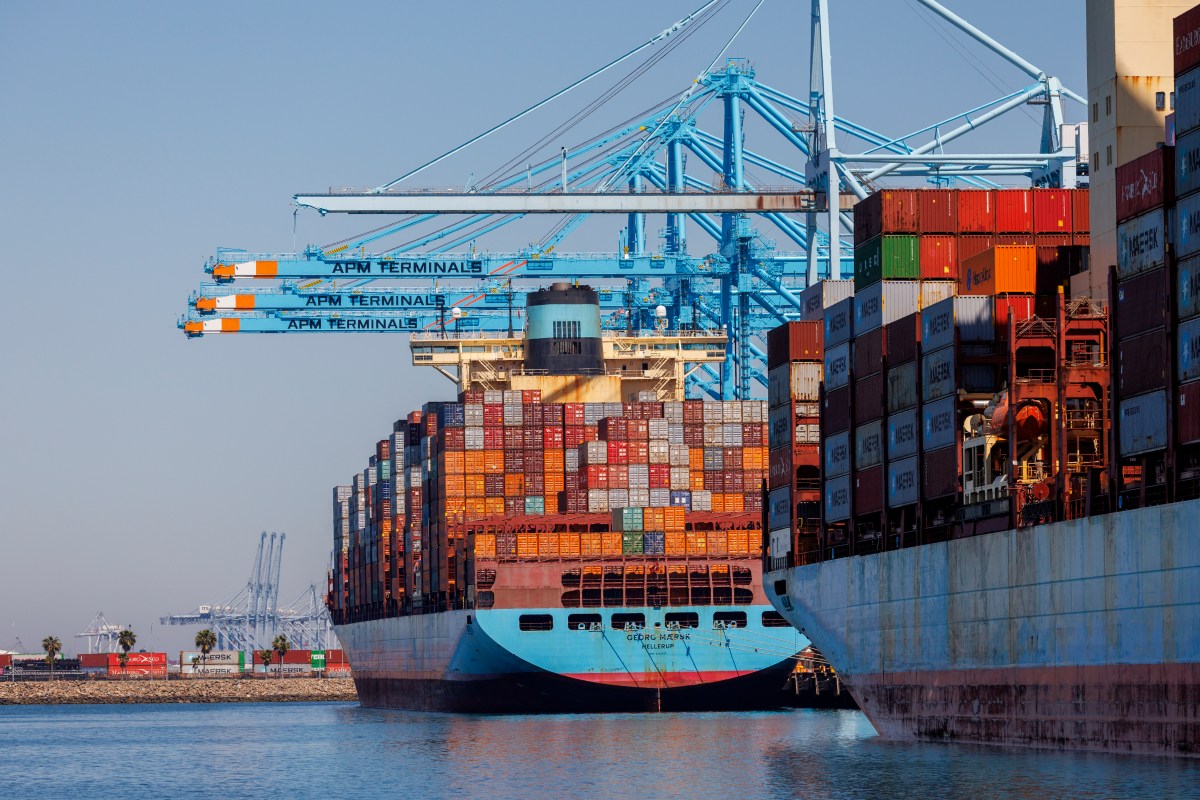
If you’ve read our coverage or listened to any of our podcasts for more than five minutes, you’ve probably come across a common refrain: Congress isn’t doing its job. The legislature, which is meant to be the dominant branch in our system, has gradually abdicated many of its responsibilities over the years, allowing the executive branch to step into the vacuum with expansive orders or rule changes. It’s left to the courts, then, to curtail the exercise of power that belongs to Congress.
There’s perhaps no clearer example of this phenomenon than President Donald Trump’s tariffs. The president has imposed worldwide levies in recent months under dubious legal authority, and the congressional majority has shrunk from reasserting its constitutional authority over tariff powers. But in a decision released late last week, the Court of International Trade (CIT) issued a permanent nationwide injunction against the Trump administration’s tariff regime, concluding that the broad duties imposed on nearly every country in the world exceed the president’s statutory and constitutional authority.
The decision represents a big win for those challenging the legality of the tariffs and offers potential relief to importers, U.S. trading partners, and global markets alike. The government has already appealed the ruling, putting the case on a potential path to the Supreme Court, but the CIT decision seemed to validate much of the challengers’ constitutional concerns with the levies.
As TMD covered earlier this year and we reported on the site, the president’s “Liberation Day” tariffs and the earlier measures targeting American imports of goods from Canada, Mexico, and China have drawn challenges from conservative public interest law firms and more than a dozen state governments. The CIT decision covered a case brought by the Liberty Justice Center (LJC), a nonpartisan public-interest law firm, on behalf of five small businesses, and a case brought by Oregon and 11 other states.
To impose his tariffs, Trump has relied on the International Emergency Economic Powers Act (IEEPA), a 1977 law that enables the president to scrutinize foreign entities and financial transactions, including by imposing sanctions, when dealing with a national emergency. To justify the Mexico, Canada, and China tariffs, the president declared national emergencies regarding fentanyl trafficking across the border with Canada, smuggling and trafficking across the Mexican border, and the synthetic opioid supply chain coming from China. The “Liberation Day” measures were imposed to address the “emergency” of trade deficits.
The LJC and the coalition of states argued that IEEPA does not confer tariff powers to the president, and even if it did, the president’s claim to an unlimited tariff authority under the statute would be unconstitutional.
Plenty of legal analysts have noted that the challengers had a strong case, as tariffs are not mentioned in IEEPA and no president has ever before implemented tariffs under the law. Congress holds tariff power, according to Article I, Section 8 of the Constitution, but the legislature has delegated some limited authorities to the executive in a few laws, which Trump used to levy tariffs during his first term. But as Grayson Logue previously explained in a piece on the site:
Those statutes require the executive branch to conduct investigations to justify tariffs on products and countries. They stipulate lengthy processes to address specific harmful trade practices and bad actors, requirements that would be doubly challenging to meet for a universal tariff regime where the justifying harm is simply the existence of trade deficits.
In its 49-page opinion last week, the three-judge CIT panel ruled unanimously in favor of those challenging Trump’s actions. “The question in the two cases before the court is whether … ‘IEEPA’ delegates these powers to the President in the form of authority to impose unlimited tariffs on goods from nearly every country in the world,” the judges wrote. “The court does not read IEEPA to confer such unbounded authority and sets aside the challenged tariffs imposed thereunder.”
In short, the judges concluded that IEEPA does not authorize unlimited tariff powers; the “Liberation Day” tariffs “lack any identifiable limits;” and therefore, the duties ought to be struck down. Regarding the Canada, Mexico, and China measures—referred to as the “Trafficking Orders” in the decision—the judges argued that the tariffs are not related enough to the declared emergencies since the duties themselves do not target trafficking efforts. “The Trafficking Orders do not ‘deal with’ their stated objectives,” they wrote. “Rather, as the Government acknowledges, the Orders aim to create leverage to ‘deal with’ those objectives.”
“However sound this might be as a diplomatic strategy, it does not comfortably meet the statutory definition of ‘deal[ing] with’ the cited emergency,” the judges added. “It is hard to conceive of any IEEPA power that could not be justified on the same ground of ‘pressure.’”
The judges—one of whom was appointed by Trump, one by Barack Obama, and one by Ronald Reagan—also expressed support for the challengers’ constitutional arguments, namely, that the IEEPA tariff regime runs afoul of the nondelegation and major questions doctrines. The former is a legal principle that Congress must delegate its powers according to “an intelligible principle” that outlines standards that courts can use to judge the proper use of the delegated powers. The unspecified and unlimited IEEPA tariff authority claimed by the administration would presumably violate such a doctrine.
The major questions doctrine is based on Supreme Court precedent that Congress must “speak clearly” in statutes used by the executive branch to take action on issues of major national significance. The Supreme Court has cited the major questions doctrine regularly in recent years, including when it struck down the Biden administration’s student loan forgiveness plan and COVID-19 vaccine mandate.
“Regardless of whether the court views the President’s actions through the nondelegation doctrine, through the major questions doctrine, or simply with separation of powers in mind, any interpretation of IEEPA that delegates unlimited tariff authority is unconstitutional,” the judges wrote.
The Trump administration quickly appealed the decision and requested the court stop the ruling from going into effect while the appeal plays out; the U.S. Court of Appeals for the Federal Circuit on Thursday granted a brief administrative stay to allow time to consider a longer stay on the decision. While stock markets initially surged following the Wednesday evening CIT decision, the subsequent stay and the broader uncertainty around the future of trade policy have muted the gains.
But the challengers in the CIT cases feel bullish about their chances of ultimate success. “In all the years I’ve been doing this, I don’t think I've ever gotten a better opinion from them, from any set of judges,” Reilly Stephens, senior counsel at LJC, told journalists on a conference call last week. Ilya Somin, a law professor at George Mason University and co-counsel on the LJC case, was also confident. “Obviously, there will be an appellate process,” he said, “but I’m guardedly optimistic, given that we got a unanimous ruling from judges appointed by both parties, including one appointed by Donald Trump himself.”
The legal case against the tariffs received another boost on Thursday when the federal District Court of the District of Columbia granted a preliminary injunction on the tariffs for the plaintiffs in a separate challenge. The ruling is preliminary, and only applies to the specific companies filing the suit, whereas the CIT decision applies to all the IEEPA tariffs and every importer they affect. But in one important respect, the judge in the D.C. case went further than the CIT panel did: While the latter focused more on its ultimate conclusion—that IEEPA does not confer unlimited tariff powers to the president—the former held that the statute does not confer any tariff authority whatsoever.
Some legal scholars think the challenges could have a harder time on appeal. Jack Goldsmith, for example—a professor at Harvard Law School and former assistant attorney general for the Office of Legal Counsel in the Bush administration—believes the legality of the IEEPA tariffs is a much closer call, arguing last week that, while the tariffs are expansive, they are not “unbounded” as the CIT described them. “[The administration] argued (and the CIT did not deny) that the Worldwide and Retaliatory Tariffs complied with IEEPA’s substantive and procedural requirements,” he wrote. Goldsmith thinks the appeal will ultimately hinge on a rigorous analysis of major questions doctrine, something he sees as lacking in the district court and CIT rulings.
In reaction to the orders last week, the president and senior White House officials have continued their pattern of lashing out at the judiciary. Trump posted a lengthy tirade on social media attacking the CIT panel and, more broadly, criticizing the influence the conservative Federalist Society wielded on judicial appointments during his first term. White House press secretary Karoline Leavitt claimed the CIT judges “brazenly abused their judicial power,” and Deputy Chief of Staff Stephen Miller argued that “the judicial coup is out of control.” He also reposted pictures and bios of each judge on the panel, saying, “We are living under a judicial tyranny.”
The appeals process will continue to play out, but the rulings from last week are another blow to the administration’s strategy of using the declaration of emergencies to use expansive executive power. “The decision is a win for the rule of law,” Somin, the co-counsel on the LJC case, wrote last week. “Major legal rules should be clearly stated, and not instantly changeable at one person’s whim. That is what differentiates the rule of law from the ‘rule of men.’”
Today’s Must-Read
Supporters of Donald Trump’s efforts to decouple the U.S. and Chinese economies at a global scale miss something more fundamental happening in America’s relationship with the Chinese Communist Party (CCP). In the domains that arguably matter most to the party—ideology and information—the United States is unilaterally surrendering. Even worse, Washington is effectively doing the CCP’s work for it. At its core, though, this problem is not one of Trump or former President Joe Biden, nor one of any political party. America is stuck in self-defeating strategic behavior—rooted in a deep-seated preexisting condition: a refusal to believe in trade-offs.
Toeing the Company Line
Pretext Upon Pretext
The Trump administration has no actual arguments—for anything.
The Last Conservative Judge
Populism comes for the Federalist Society.
What Can We Learn from Pope Leo’s First Few Weeks?
Examining the new pope’s early words and actions.
An Adult World, Without Adults
Why do we let our children roam an online world of porn, violence, and cruelty?
Chatbots Aren’t Geniuses
The human tasks that AI is automating are no miracles of cognition.
How Kindness Became Criminalized
Even charity now requires a permit.
What We Got Wrong in May
A list of corrections issued by The Dispatch last month.
DOGE-ing Bullets
Podcasting about what makes you angry.
Worth Your Time
- For Bloomberg, Francis Wilkinson reported from Charleroi, Pennsylvania, an economically depressed small town that has recently experienced an influx of Haitian migrants. Many of them are considering leaving—and the town’s inhabitants are celebrating, even as they demand greater support from the federal government. “Many immigrants were recruited to Charleroi to work at a local frozen food plant or in nearby warehouses,” Wilkinson noted. “Immigrants have moved into vacant apartments, filled church pews, sent their kids to school, opened new businesses. The town’s population, which had been in decades-long decline from a 20th-century peak of nearly 12,000, began to grow. ‘The last couple years, quite honestly, the immigrants have really helped bring the community back,’ said Mark Alteseri, a third-generation Charleroi resident and local business owner.” Wilkinson asked Charleroi borough council member Larry Celaschi repeatedly how he imagined the town would prosper if its recent population growth reverse: “He didn’t answer except to say that Charleroi needs to quit being satisfied with piddly public grants from the state and federal governments. What Charleroi needs instead are really, really big public grants. ‘I think we’re owed that after what we’ve been going through down here,’ he said.”
- John Jeremiah Sullivan, one of America’s greatest living essayists, wrote for Harper’s Magazine about the recent resurgence in interest in one of America’s greatest late essayists: Mark Twain. “Huck is not being cute, at that moment in his and Jim’s story, after he has decided, ‘All right, then, I’ll go to hell,’” Sullivan wrote. “(Those italics on ‘go’!—the full meaning of them, of the sound of them, could never be explained to a non-native speaker, and can hardly be parsed by a native one; they represent, without a doubt, a high-water mark in the history of idiomatic American prose; to have italicized ‘I’ll’ or ‘hell’ would have put the emphasis on Huck’s personal heroism, but to italicize ‘go’ indicts, instead, an entire monstrous moral code: ‘Fine, you motherf—rs. I’ll go to hell, before I send Jim back to the plantation.’)”
Presented Without Comment
Associated Press: Sen. Joni Ernst Defends Medicaid Cuts, Says ‘Well, We All Are Going To Die’
Also Presented Without Comment
The Hill: Stephen Miller on Report of Musk Drug Use: ‘We’re Worried About Drugs Crossing the Border’
Also Also Presented Without Comment
Jewish Insider: [Former Biden National Security Adviser] Jake Sullivan Applauds Trump Approach to Iranian Nuclear Negotiations
In the Zeitgeist
Netflix just released a trailer for this cinematic match made in heaven: Frankenstein, directed by master of the weird, Guillermo del Toro:
Let Us Know
What effect, if any, do you think the courts’ rulings will have on President Donald Trump’s efforts to implement his trade agenda?

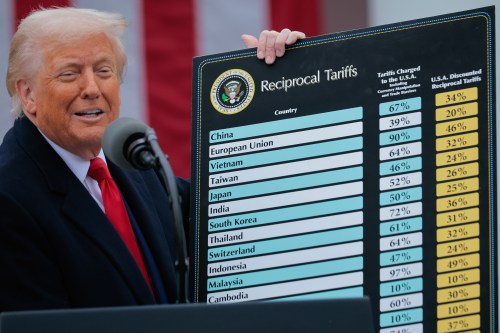

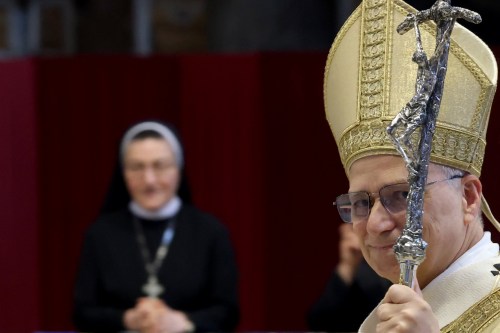




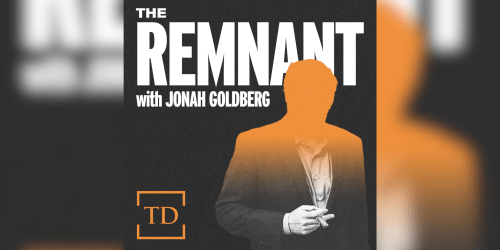


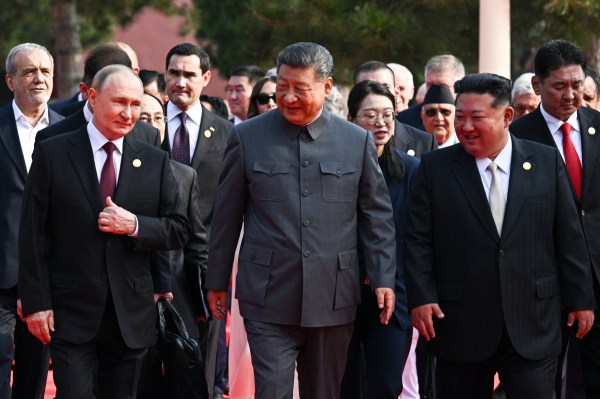
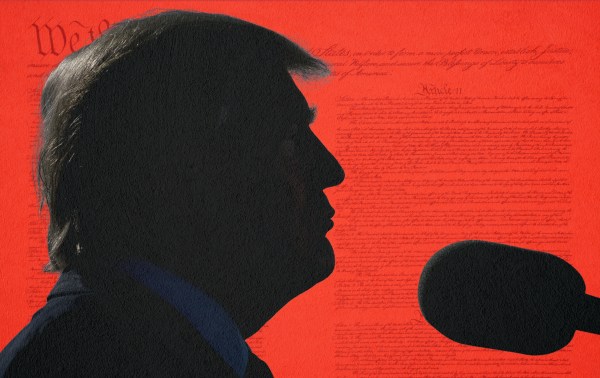


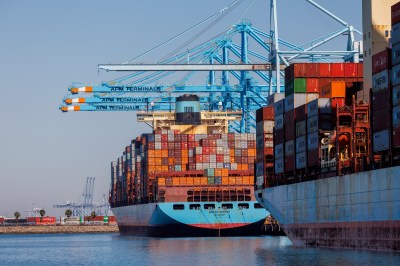
Please note that we at The Dispatch hold ourselves, our work, and our commenters to a higher standard than other places on the internet. We welcome comments that foster genuine debate or discussion—including comments critical of us or our work—but responses that include ad hominem attacks on fellow Dispatch members or are intended to stoke fear and anger may be moderated.
With your membership, you only have the ability to comment on The Morning Dispatch articles. Consider upgrading to join the conversation everywhere.